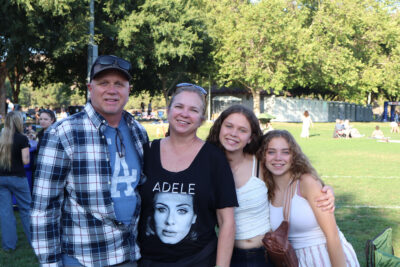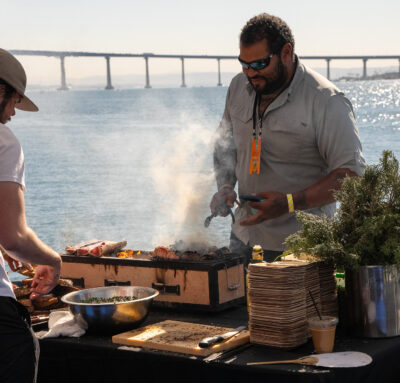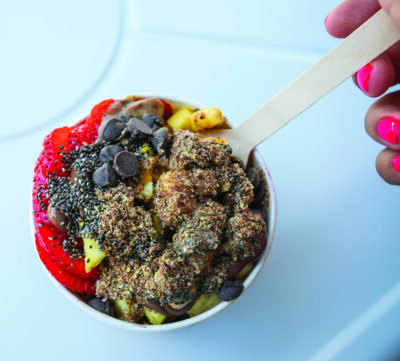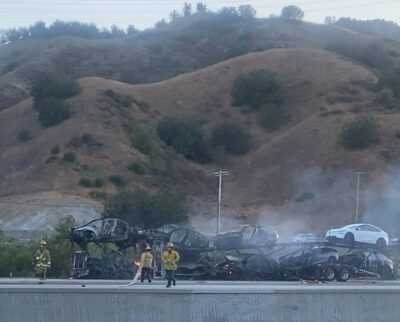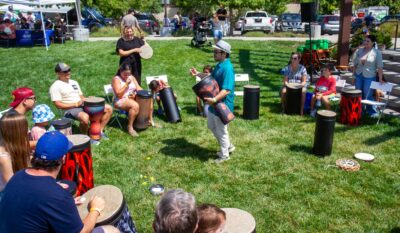Between Dec. 23, 2022, and Jan. 15, 2023, Agua Dulce motorbike racer Mason Klein competed in the Dakar Rally, a multi-day, cross-country race that takes place in Saudi Arabia. By his ninth day racing, Klein said he’d been the overall leader, but a crash he experienced at 100 mph caused damage to both his chances of winning and to his body.
At the time, a camera crew was capturing the Dakar experience in a documentary called “Dakar: Race Against the Desert.” Klein is one of the subjects featured in the doc. It’s scheduled to be available on demand beginning May 13.
“Really, the whole time I was just praying they didn’t cut me from the movie,” Klein said during a recent telephone interview. “But I saw it and I thought it was pretty cool. I cried a little at the end.”

Both the experience of being in the documentary and seeing the final product was what Klein called “epic.” Watching it made him want to go dirt-bike riding.
Klein, who was 21 years old when he competed in the Dakar Rally that’s shown in the film, competed the prior year, with the goal of becoming the youngest motorbike racer to go into the Dakar Rally as one of the top 10 riders in the world. Going into that 2022-23 race, he secured the No. 9 spot among more than 50 racers whose ages ranged from the mid-20s to those in their 70s.
The Dakar Rally, which is a 16-day race through the desert, requires riders to, according to Klein, navigate more than 5,200 miles of dunes and rocky terrain. And while one might think racers could simply use global positioning systems to find their way, GPS is not allowed. Klein said that’s all part of the challenge of the race.

Seth Quintero, a San Diego resident who raced lightweight prototype vehicles at Dakar that year and who is also featured in the documentary, said the Dakar Rally is a taxing couple of weeks.
“That race is by far the most brutal and vigorous race on the face of the planet,” he said in an interview over the phone. “It throws a lot of different things at you, whether that’s the marathon stages or racing for 48 hours, or sleeping in these remote areas and not having food and not having service to your vehicle or bike. Yeah, very taxing on the brain, very taxing on the body. It’s just one of those things that you question why you do it every year, and then you finish it, and you fall in love with it all over again.”
The race was especially brutal for Klein. Despite crashing and suffering mounting head pain and neck pain, he continued racing. After a couple of days under those conditions, however, he exited the race and saw a doctor out near the race site. The good news: no broken bones. Klein would later learn when he came home and saw an American doctor that he’d suffered two concussions.

All of that is said to be part of the story told in “Dakar: Race Against the Desert,” which is a Universal Pictures co-production. Director Jalil Lespert and his fellow filmmakers set out to encapsulate the Dakar Rally, a 45-year-old race that many consider to be the ultimate test of resilience, skill and endurance.
According to promotional materials, “Dakar: Race Against the Desert” follows several Dakar Rally competitors across categories — from T1 cars to T3 UTVs — including men and women, veterans and newcomers. Klein is featured as a rising star.
The Agua Dulce native was thrilled to be a part of the project. His dad, who was a member of his crew, played a part in the making of the documentary.
“I was obviously riding, trying to win,” Klein said. “But my dad did a good job keeping the cameras everywhere. It was cool. They (the filmmakers) all came to my house, and we did a ride day. I got to hang out with some of the people a year or two later in Spain, doing some more stuff for the film. It’s been a pretty great experience.”
Since shooting the documentary, Klein competed in the Dakar Rally two more times. He’s currently looking to do it a fifth time in December, but he said he needs help.
“You need a really good bike to finish the race,” he said. “You need an even better bike to win,” adding from experience and with perhaps a bit of sarcasm that “it’s pretty difficult to win when your engine is blowing up three times before day 7.”
In other words, Klein left a former team for what might seem to be obvious reasons. He hopes to find a new team or sponsors to get him back to Dakar again. To compete, he said it costs about $120,000. To win, he said you need upward of about $160,000. Baked into that dollar amount are mechanics and other crew members, airfares, the cost of food for everyone, the bike, tires, fuel pumps, bearings, chains, sprockets and quite a bit more.
Tires, for example, are a daily expense, he said. That could cost $5,000 to $10,000 right there.
The premiere of “Dakar: Race Against the Desert” was on May 5 at Universal Studios. Klein was excited to see what others would think of the film. Quintero hadn’t seen the film before the premier. He was looking forward to revisiting that time in his life.
To see a trailer for “Dakar: Race Against the Desert,” go to bit.ly/435HJYJ.



